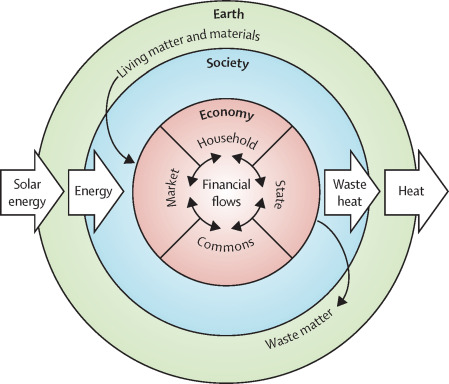I have new open access paper in @TheLancetPlanet. It's a theoretical framework that aims to shed light on some reasons that neoliberal capitalism is struggling with COVID, despite having such unprecedented potential to deal with it. A thread. https://www.thelancet.com/journals/lanplh/article/PIIS2542-5196(20)30252-7/fulltext 1/15
I start with the idea that the economy is any system that we use to transform and distribute the earth's resources. There are lots of possible ways to organise an economy. This analysis is a key starting point of ecological and feminist economics. 2/15
@KateRaworth's embedded economy diagram is a great illustration of the ecological/feminist perspective. We see 4 different economic sub-systems: the household, state, commons and market. In any economic system, different ways of producing are seen as more or less important. 3/15
Neoliberal capitalism see's the market as the most important. Below the market is the state, which is only important for creating and protecting markets. The household and commons are unimportant. 4/15
The market, state, commons &household all have different dynamics. Markets are mainly motivated by the production of monetary value. Under neoliberal capitalism markets are the main economic system. So neoliberal capitalism mainly produces things that make money. 5/15
Prioritising markets and monetary value has had some benefits. In their drive to make money capitalists have made everything more productive. For every worker, every gust of wind and every lump of coal, our economies produce much more than they could 300 years ago. But... 6/15
Under neoliberal capitalism, increased productive capacity is mainly put back into producing more money. So we see some benefits for health from increased productivity but not as much as you might think. 7/15
As @ProfTimJackson points out, life expectancy at birth was lower in the USA than in other countries with less productive capacity. In 2018, life expectancy was 80 in Chile, 80·1 in Costa Rica, & 78·7 years in Cuba compared with 78·5 years in the USA. https://www.routledge.com/Prosperity-without-Growth-Foundations-for-the-Economy-of-Tomorrow-2nd/Jackson/p/book/9781138935419 8/15
Health gains can be achieved for less productive capacity than we have. This is also stressed by @JKSteinberger et al., who argue that we need to look at how additional productive capacity *is used* to understand its effects on life expectancy. https://iopscience.iop.org/article/10.1088/1748-9326/ab7461 9/15
That productive capacity under neoliberal capitalism is mainly used to make money helps explain why COVID is such a challenge. A focus on making money meant that pre-pandemic health wasn't a priority. Only after COVID hit were resources pushed to health systems 10/15
We also see the prioritisation of activities that make lots of money in the work sphere. This figure shows average weekly earnings in The financial and health sectors in the UK. This difference is partly due to neoliberalism's hierarchy of production methods. 11/15
Responses to COVID have created a push back against the hierarchy of value & production methods of neoliberal capitalism. The protection of health has risen up the priority list. Health is hard to value in monetary terms so this has led to actions that reduce monetary value 12/15
The push back is small but significant. E.g. for decades, health care has been marketised & privatised as part of a general shrinking of the state. However, there have been lots of initiatives that expand state provision of health care: https://analysis.covid19healthsystem.org/index.php/2020/04/27/how-are-countries-removing-financial-barriers-to-accessing-health-services-in-the-context-of-covid-19/ 13/15
There are 2 implications. 1) we need to reduce the importance of markets & the dominance of monetary value. To make the most of productive capacity developed by capitalism, we need to channel more of it to non-monetary ends. This is essential to building resilience 14/15
2) reducing the importance of monetary value is a theoretical & political task. Neoliberal practice is rooted in economic theory. We need alternatives. But theories alone are not enough, we have to embed new theories in institutions. This requires activism & political action. END

 Read on Twitter
Read on Twitter



